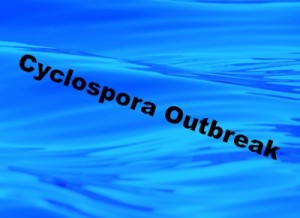The Cyclospora outbreak that has been reported by health departments in several midwestern states may have sickened as many as 183 people. The Iowa Department of Public Health released new information today saying their case count is up to 87. In Nebraska, 54 people are sick, and Texas has 37 cases of the parasitic disease so far this year; of those, 29 in north Texas were reported just this week.
 According to news reports, Illinois has two cases, Kansas has one, and Wisconsin has two cases. Public health officials are not sure if the cases in Texas, Illinois, Kansas, and Wisconsin are linked to the outbreak in Iowa and Nebraska.
According to news reports, Illinois has two cases, Kansas has one, and Wisconsin has two cases. Public health officials are not sure if the cases in Texas, Illinois, Kansas, and Wisconsin are linked to the outbreak in Iowa and Nebraska.
This one-celled parasite enters the body in the form of an oocyst when you eat contaminated food or drink contaminated water. Fresh vegetables are suspected in this current outbreak. It’s interesting that both the Iowa and Nebraska health departments have stated that no locally grown produce is suspected as being the source of the parasite.
Most foodborne parasites are infectious immediately, but Cyclospora cayetanensis doesn’t become infectious until days after it’s passed in a bowel movement. That’s why it’s most commonly spread on food. Risk factors for this disease used to be travel to developing countries, but with our global food market, anyone can get it. It’s difficult to wash the oocysts off fresh produce, especially soft fruits such as raspberries.
The symptoms of a Cyclospora infection begin two to eleven days after exposure. They include watery diarrhea, which can last for two months, frequent and sometimes explosive bowel movements, loss of appetite, stomach cramps, flatulence, nausea, vomiting, fatigue, low grade fever, and weight loss. Dehydration can be a serious complication of this infection. Because the oocysts are shed intermittently, several tests may be necessary to diagnose the infection.
Another issue with this infection is that treatment with a sulfa drug is the first choice. Many people are allergic to sulfa, and there are no “highly effective alternatives”, according to the CDC. Some evidence suggests that Cipro may be an effective treatment, but “substantial anecdotal experience” doesn’t support those drugs. In addition, symptomatic reinfection can occur.




